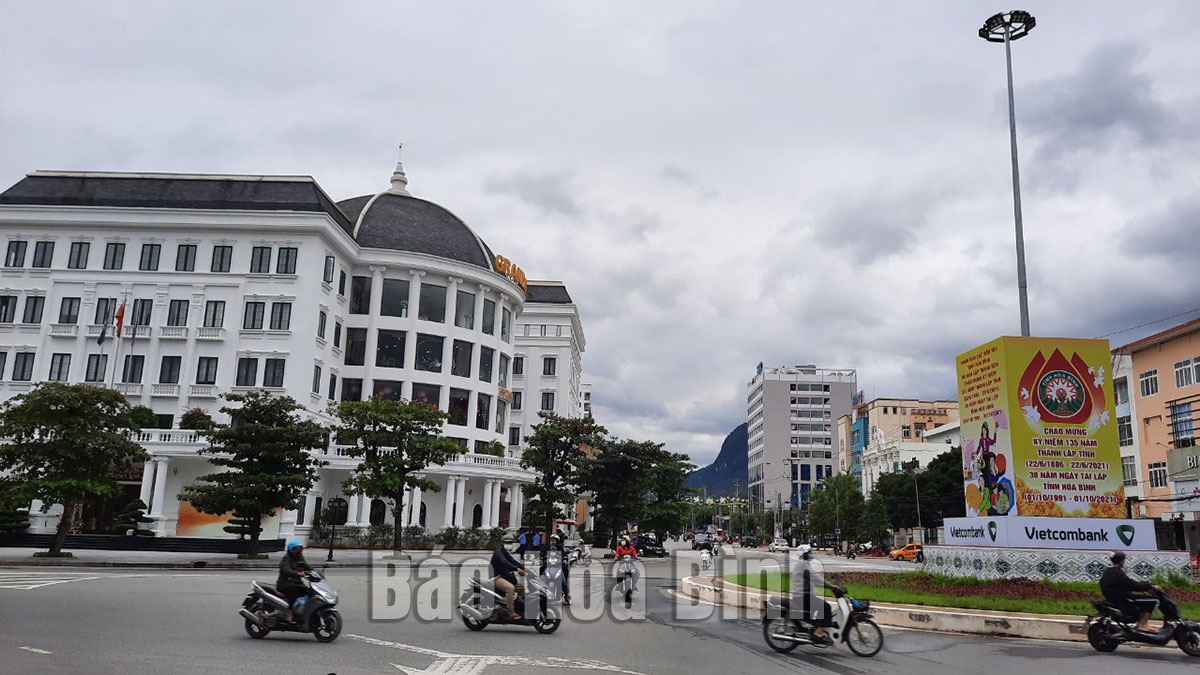
(HBO) – Hoa Binh province has witnessed a strong development of infrastructure facilities serving trade, tourism, culture and services in recent years, which has contributed to improving the spiritual life of local people.
The improvement of infrastructure system in the locality is hoped to contribute to turning tourism and service into spearhead economic sectors of the locality.
 A modern shopping centre on the left bank of the Da River in Hoa Binh city.
A modern shopping centre on the left bank of the Da River in Hoa Binh city.
In recent times, urban, commerce and service infrastructure in all localities in the province have changed markedly. Hoa Binh city has mobilised thousands of billions of dong to invest in infrastructure development and implement a series of urban embellishment, traffic, trade and tourism projects.
Investment projects in transport infrastructure, including bridges across the Da River, open up new chances to expand Hoa Binh city. Trade and services account for an increasingly high proportion in the province’s economic structure.
Many important projects such as the roads connecting Hoa Lac (Hanoi) with Hoa Binh city and National Highway 6 with Chi Lang Street, Road 435, and Hoa Binh Bridges No. 2 and 3, were put into use.
The local authorities have enhanced investment promotion activities and encouraged organizations and individuals to pour investment into eco-tourism, resort, spiritual culture tourism projects. It has attracted investment in eco-tourism destinations such as Mai Chau Hideaway, Mai Chai Ecolodge, Ba Khan Village Resort in Mai Chau district; Sunset Villa and Resort in Luong Son district; and Serena Resort in Kim Boi district.
Many community-based tourism areas were developed in the area around Hoa Binh Lake, including Duc Phong village, Sung village and Ke village in Da Bac district, and Ngoi village in Tan Lac district.
In 2020, the province had 434 accommodation establishments, including six three-star hotels, 25 two-star hotels, 8 one-star hotels, 238 hostels, 157 homestays with a total of 4,000 rooms. It is home to 9 local tourism areas, one provincial-level tourism site, 13 travel firms. The number of tourists and total revenue from tourism activities in the province have consistently increased, averaging over 10 percent a year.
So far, all the ten districts of Hoa Binh province and Hoa Binh city have had culture, sports and information centres, communal houses and stadiums. The province has a total of 120 communal houses and community learning centres in communes, wards and towns; and 1,630 communal houses and 1,172 sports grounds in villages, hamlets, residential quarters and residential areas.
Local commercial and service activities have developed strongly. The province has nearly 1,000 businesses, and about 30,000 business households. The province is also home to many reputable agents and distributors, which provide quality products meeting the demand of local people.
Cargo and passenger transport services have also developed rapidly. Tourism service has gradually become an important economic sector of the locality./.
Hoa Binh province is undergoing a dynamic transformation amid Vietnam’s national digital transition. Building on Poliburo’s Resolution No. 57-NQ/TW on breakthroughs in science, technology, innovation, and national digital transformation, the province has rolled out a wide range of practical action plans. A standout initiative is the "Digital Literacy for All” movement, an effort to ensure that no one is left behind in the digital era.
Hoa Binh province is undergoing a dynamic transformation in the wake of the national digital transformation movement. Building on Resolution No. 57-NQ/TW of the Politburo on breakthroughs in science, technology, innovation, and national digital transformation, the province has implemented a wide range of practical action plans. A standout initiative is the "Digital Literacy for All” movement ambitious effort to ensure that no one is left behind in the digital age.
With a spirit of unity and proactive problem-solving, the Party Committee, the government and the people of Dong Lai Commune (Tan Lac District) have made great strides in implementing the resolutions of the 24th Party Congress of the commune for the 2020 - 2025 term. Focusing on leadership and practical actions, the commune has brought the Party’s resolutions into daily life, creating strong impacts and pushing the local development forward.
Amid the nationwide push for digital transformation, young people in Hoa Binh Province are stepping up as dynamic pioneers, applying technology to enhance Youth Union operations and expand the reach of youth-led initiatives. Through creativity and adaptability, Youth Union organizations at all levels have introduced a series of practical solutions, contributing to modern governance and community development.
In recent years, An Nghia commune, located in Lac Son district, has stepped up administrative reform, focusing on improving the quality and efficiency of its single-window service unit for receiving and processing administrative procedures. These improvements have helped create favourable conditions for local residents and organisations to handle administrative procedures, contributing to the commune’s broader socio-economic development.
The Prime Minister-approved master plan to develop the multi-use value of forests ecosystems through 2030, with a vision to 2050, aims to improve the management and sustainable use of forest resources, create jobs, increase incomes, and improve the living standards of ethnic minorities, people in mountainous and remote areas, forest workers and those living near forests.



 A modern shopping centre on the left bank of the Da River in Hoa Binh city.
A modern shopping centre on the left bank of the Da River in Hoa Binh city.